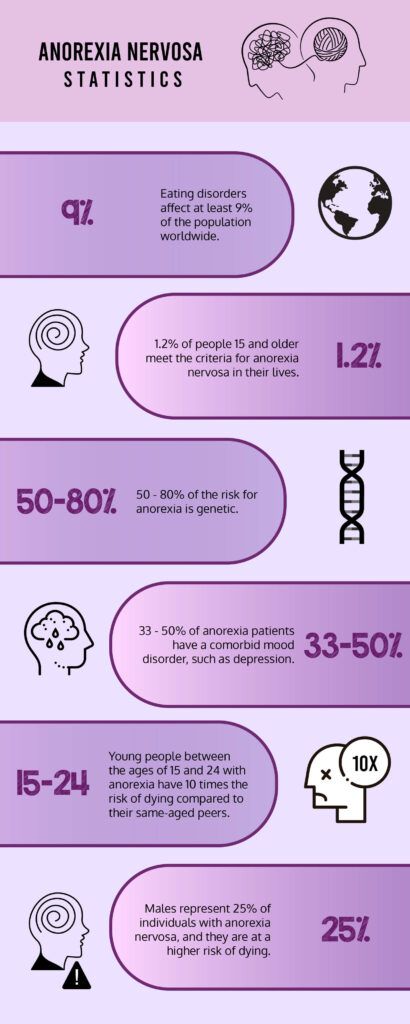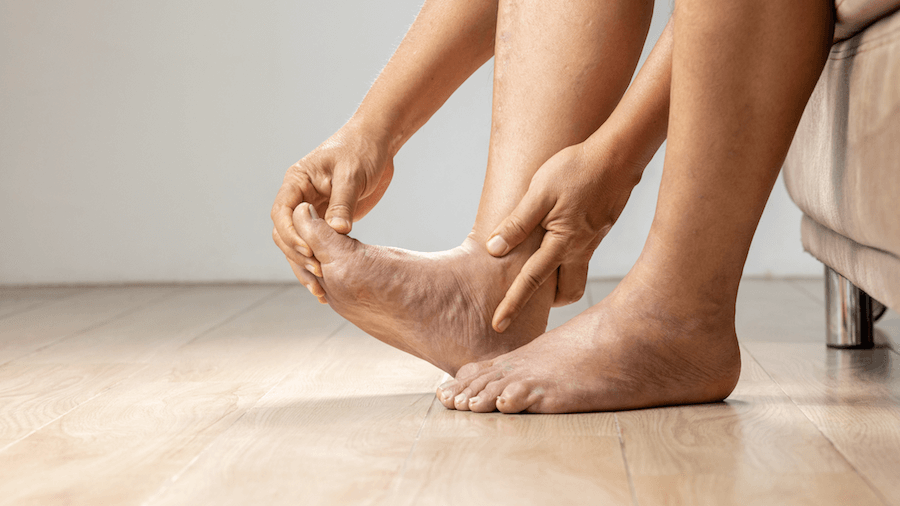Studies suggest that female relatives of people with anorexia are 11 times more likely to develop it. This points towards the involvement of genetics in some capacity. Though the exact genes that influence it are unknown, it may be caused by a combination of several genes and other lifestyle and environmental factors. This article explores anorexia in-depth, discussing its causes, symptoms, genetics, and treatment options.
Check your raw DNA data for genetic variants of anorexia nervosa
What Is Anorexia Nervosa?
Anorexia nervosa, also referred to as anorexia, is a psychological and potentially life-threatening eating disorder.
It is characterized by an excessive fear of weight gain.
Anorexia is typically seen in adolescent girls and young women, but anyone can develop this metabolic condition.
Professionals who are expected to be fit and lean at all times tend to develop this condition more commonly.
These include athletes, models, actresses, etc.
Types Of Anorexia Nervosa
| Restrictive | Binge/Purge |
| Involves restricting calorie consumption by avoiding certain types of foods, skipping meals, and over-exercising. | Starvation is accompanied by periods of binge eating. Gear of weight gain results in self-induced vomiting and misusing enemas and laxatives. |
Is Anorexia Nervosa Genetic?
The role of genetics in eating disorders has been a subject of research for decades.
Several studies have examined the genetic angle of anorexia nervosa:
- The risk of anorexia can increase 11-fold in people with a positive family history of anorexia. The general population’s anorexia risk is 0.5%.
- Genetics could be responsible for up to 60% of your anorexia risk.
- Anorexia has been significantly correlated to other psychiatric and metabolic conditions.
Eight genes were found to play a role in anorexia, and they are all involved in appetite control. Mutations in these genes could change your perception of hunger.

What Are The Signs And Symptoms Of Anorexia Nervosa
The signs and symptoms of this metabolic disorder can be classified into – physical, psychological, or behavioral.
Physical Symptoms
- Severe or excessive loss of muscle mass
- Extreme weight loss
- Fatigue and tiredness
- Insomnia
- Abnormal blood count
- Frequent fainting and dizziness
- Thinning of hair and increased hair loss
- Abnormal menstrual cycle or its complete absence
- Dehydration
- Hypothermia(low body temperature)
- Abdominal pain and constipation
- Osteoporosis
- Swollen hands and feet
Psychological Or Behavioral Symptoms
- Constant and excessive concern about putting on weight
- Excess workouts and exercises
- Constantly measuring their body weight and checking themselves out in the mirror.
- Severe food restriction
- Being dishonest about food intake
- Low or depressed mood
- Reduced sex drive
Risk Factors For Anorexia Nervosa
Psychological Factors
People with OCD have a higher risk of developing anorexia.
They are more likely to follow strict diets, forego eating and go hungry for days without food.
They also tend to go to extremes to achieve perfection; feeling like they aren't at their “ideal” body weight.
Environmental Factors
Many people tend to develop anorexia due to societal pressure that gives a lot of importance to “being thin.”
Peer pressure could fuel young girls’ need to be thinner, leading to eating disorders.
Gender
Anorexia is more common in women and often seen in teenage girls, but there is a rising trend of this disease occuring in women over 50..
Though studies are still underway, a new study has suggested that there may be a neurological reason for the disparity of the disease occurrence in men and women.
Women are more likely to experience a negative perception of their bodies than men, making them think they must be 'thin.'
Social Media
While social media can’t directly cause an eating disorder, the toxic environments it creates can certainly lead to problems down the road.
The information shared on social media can significantly influence how a person thinks, feels, behaves.
It has a big impact on their self-image and self-esteem.
A 2017 meta-analysis identified a positive correlation between the use of social media and irregular eating behaviors.
The study further confirmed that the excessive use of social media is associated with an increased risk of disordered eating behaviors.
How Anorexia Affects Your Brain
Disordered eating impacts our physical and mental well-being.
Eating disorders like anorexia can significantly affect the nervous system and the brain.
The following are some effects anorexia has on the brain:
- Disruptions in neurotransmitter release and behavior
- Structural changes in some parts of the brain
- Abnormal brain activity during anorexic states
- Nerve-related issues such as seizures, disordered thinking, tingling, numbness, and odd sensations in the hands and feet
- Decreased brain size, including white and grey matter.
- Adversely affects the emotional center of the brain, resulting in depression, irritability, and isolation.
- Difficulty in rational thinking and normal functioning of the brain to perform daily activities
Research has shown that people who have recovered from or are currently experiencing anorexia have abnormal brain activity.
Their brains react to stimuli and produce serotonin differently.
Insomnia is also a symptom associated with anorexia.
The weight loss, malnutrition, and starvation seen in people with anorexia can also contribute to poorer sleep quality and duration.
However, whether these changes in pathways and brain responses are seen before a person develops anorexia remains unknown.ith an increased risk of disordered eating behaviors.
Anorexia Nervosa: The Myths And Facts
- Myth: Eating disorders are not an illness
The American Psychiatric Association classifies eating disorders as mental illnesses that often develop due to unresolved underlying issues.
If left untreated, they can result in more serious medical conditions.
- Myth: Only women suffer from eating disorders
Females are generally at a higher risk of developing AN, but a recent study conducted at Harvard found that 25% of AN and bulimia cases were people assigned male at birth. They posited that these numbers were lower because these cases are often unreported or undiagnosed.
- Myth: People who have anorexia are thin
Not everyone who suffers from anorexia has a stereotypical 'anorexic' look.
Anorexia can look like someone with a healthy weight who’s unhappy with their appearance and trying to lose weight.
Additionally, not all thin people have anorexia.
Some people suffering from other eating disorders like bulimia can also appear excessively thin..
- Myth: Eating disorders cannot be treated
It’s a common misconception that anorexia is a lifelong condition.
With enough treatment, time, and effort, anorexia can be overcome.
- Myth: Anorexia and other eating disorders are only about food
While they’re called eating disorders, they result from a combination of biological, psychological and social factors.
People with anorexia are more fixated on their appearance than on what or how they eat.
How Is Anorexia Diagnosed?
Patients who are suspected to be suffering from anorexia are diagnosed as per the Diagnostic and Statistical Manual of Mental Disorders- Fifth Edition (DSM-V), published by the American Psychiatric Association in 2013.
As per the manual, a person is anorexic if they fulfill the following criteria:
- Restricted food intake resulting in significantly lower body weight than expected for someone's age, sex, and height.
- Fear of gaining weight and appearing unpresentable.
- A distorted view of themselves and their condition, such as thinking they are overweight when underweight or believing that they will gain weight from eating one meal. People with anorexia believe that a low body weight is ideal. Professionals label these thoughts 'distortions'.
By keeping the above DSM-V criteria in mind, doctors will perform multiple tests to rule out any other disorders. These tests include
Other Tests: X-rays to check for bone density and fractures and ECG to detect any cardiac abnormalities.lities.
Physical Examination: Measurement of BMI, vital signs, skin health, and abdominal examination.
Lab Tests: Routine tests to analyze blood and detect the levels of electrolytes and liver enzymes that indicate the body’s fasting mode.
Psychological Evaluation: Mental health professionals evaluate patients' thoughts, feelings, emotions, and eating habits.
Treating And Managing Anorexia Nervosa
The treatment is usually a team approach.
It involves efforts by doctors, mental health specialists, dieticians, and the willingness of the patient.
If the patient suffers from serious effects of eating disorders, they may need hospitalization.
It can help correct medical complications, malnutrition, and psychiatric problems.
After the patient is stable, the next step is to nourish them to a healthy body weight.
Nutritionists work with psychologists to develop strategies that correct the patient’s perception of their appearance and weight.
A dietician works to monitor the patient’s diet and nutritional intake constantly.
The treatment process and management are incomplete without mental and emotional support from family and friends.
Can Home Remedies Help?
If you are diagnosed with anorexia, you should seek the advice of a qualified medical practitioner.
Along with their recommendations, some home remedies can help manage the condition.
- Develop smart eating habits: Patients can unlearn their distorted self-perceptions by eating nutritious food and gradually satisfying their hunger. If required, a physician can prescribe vitamin supplements. Gradually, this regimen will boost appetite and calm the mind.
- Rebuild your confidence: Always wear clothes that you feel confident in. Try not to feel conscious or ashamed of your appearance.
- Feel free to treat yourself: Indulge in the foods you like, have a day out at a spa, or take a short vacation. Self-care can boost confidence and self-worth significantly.
- Seek support: Everyone needs help and support at times in their lives. Be brave enough to seek help from loved ones.
- Get good sleep: Sleep and anorexia are interlinked.Healthy sleeping habits can help with anorexia. Your mind needs to rest just as much as your body.
- Yoga and meditation: Practicing yoga and meditation regularly can help one control their thoughts and emotions better by calming the mind and body.cess of controlling their thoughts and feelings that prompt such behavior.
The Bottom Line
Anorexia is one of the most dangerous, potentially life-threatening mental health illnesses.
In most cases, these individuals appear to have ‘healthy’ lifestyles but are fighting battles within themselves.
It’s important to remember that ‘eating disorder’ implies a distorted eating behaviour, not a tantrum about eating food.
Such recurrent, disordered thoughts overtake the person's mind slowly.
Recovering from an eating disorder is challenging but not impossible.
Substance abuse is overcome by cutting out dangerous substances, but eating disorders are overcome only by recognizing that we need food to stay alive and well.
More than anything, people with anorexia desperately need love, care, and reassurance from the people around them.
Summary: Is Anorexia Genetic?
- Anorexia nervosa is an eating disorder that is characterized by self-starvation and excessive weight loss.
- Studies have suggested that having a family member with an eating disorder can increase your risk up to 12 times.
- A GWAS identified 8 genetic loci associated with anorexia; most of these genes that play a role in appetite signaling have also been associated with other metabolic and psychiatric disorders.
- Anorexia can affect your mental health and sleep negatively.
- Depending on how severe the condition is, anorexia may require hospitalization and a team of doctors, psychiatrists, and dieticians for recovery.
Others Are Also Reading

Are Stretch Marks Genetic?

Is Gout Hereditary? How To Identify Your Genetic Risk

How Genes Influence Your Risk For Lactose Intolerance




